Written by Edward
My name is Edward Hayek. I am 14 years old, I have three brothers and I am the first in my family to be impacted by NF1.
Mum noticed my first birth mark when I was six months old and by eight months I had ten of them of various sizes scattered all over my body. I reached all the infant milestones expected in the first years of my life, but there were things that mum noticed that did not seem right.
I hated swings and slippery dips, I didn’t like to climb trees and I ran like an old man. My younger brother was always able to beat me at sport and could ride a bike when I couldn’t.
As I reached primary school, I struggled to keep up during sport, so making friends with boys my age was difficult. I couldn’t catch a ball and it always seemed to hit me in the face.
One day when I was about ten, I held Mum’s hand tight as we crossed the road, but my little brother didn’t. I could not tell how fast the car was coming towards me, so I didn’t feel safe.
Primary school was an incredibly lonely experience, particularly from Grade 2 to 5. I didn’t have friends and I was bullied. No one liked me.
I couldn’t play sport at lunchtime, so I wasn’t welcome. I felt like I didn’t seem to fit in anywhere. I guess I was a bit quirky and rumours were spread about me just to be mean. I was the new kid and never really found a group of friends.
I started to believe that this was my life, that I would never have friends. When I thought I did make a ‘friend’ they stabbed me in the back, spread more rumours and talked behind my back in an attempt to be more popular themselves.
The same group of kids continued to bully me all the way through school to Year 6, before (unbelievably) things got even worse. It started with comments about my skinny body structure, suggesting that no one would ever find me attractive and that I would die alone. Worst of all, they taunted me with the notion that I should go kill myself. I rarely spoke to teachers or my parents about how I was feeling as the threats scared me so much.

During those years I began to feel anxious, depressed and developed trust issues. There were times when I hated my life and wondered quite seriously about whether I did want to die. I felt worthless, thought that nobody would ever like me and wondered who would even care if I did die. I could not see that my family loved me. In my mind, I believed that they only said those words because they had to, not because they really meant it."
Sometimes one single act of kindness and a single friend is all it takes to stem the tide of hate.
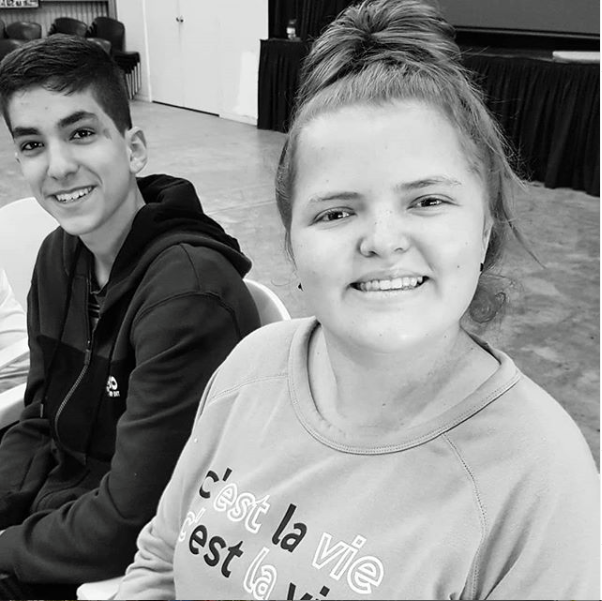
The first turning point for me was a moment in Year 5 when I spent the day with a friend I had not seen since Kindergarten - just having fun and chatting all day long.
It was just enough to shift my thinking. In that moment I realised that if I could make one friend, I could make more, but more importantly, I knew that someone would care if I died.
I knew I was not worthless.
The other big influence on my life occurred when I attended my first NF camp with the Children’s Tumour Foundation.
I met other people my age who struggled to fit in and were often bullied. We became a strong support network for each other; our friendships growing stronger every year that we reunited at camp. I slowly realised that there are people who actually care so the things the bullies were saying didn’t bother me so much and I discovered that there are people I can relate to.
By the end of Year 5 I had a few friends that I could trust wouldn’t backstab or pretend to be my friend, but the majority of people ignored me or were bullies.
Just before Christmas 2015, I was scheduled to have an MRI to try and determine the cause of the constant headaches I was having. The results were not good. I had a tumour the size of a golf ball in my right cerebellum, but my parents decided to let me enjoy Christmas and not worry me with the results until the neurosurgeon’s appointment in January was confirmed.
Within a few days of that happening, I was scheduled for surgery with Dr Dexter to have it removed. We were lucky. The ‘beastie’ was contained in a capsule and had not penetrated the rest of my brain and I only had a day or two to worry myself over it.
I remember my nurse Eddie was really kind and playful. I remember trying to catch a balloon and feeling weird moving through the corridors with walls spinning past me. My family visited me every day, but the entire Christmas holiday was spent recovering from surgery. The only friend who came to see me was my old friend from Kindy.

I returned to school with a big scar behind my right ear the shape of a question mark and a new outlook on life! I knew I was here for a reason! By surviving brain surgery, I realised that I must have something important to offer the world in the future. This has been my constant thought in the years since. "
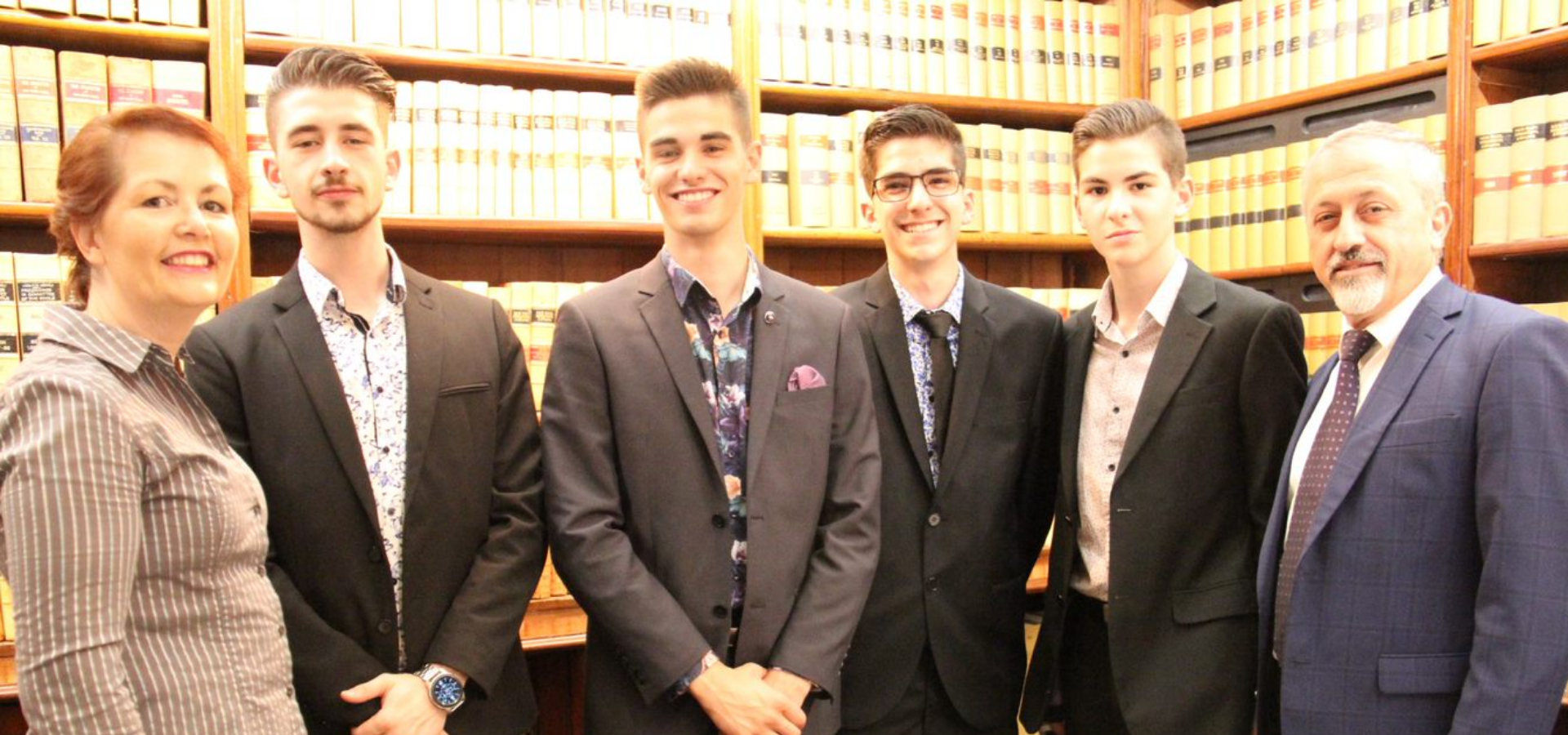
In my final year of Primary school, I decided to give a presentation in class about my surgery and condition, opening up the discussion about NF and allowed kids the chance to ask about my scar.
Almost immediately following the surgery, I found my sense of coordination and no longer ran like an old man. I celebrated by joining the basketball team and started to learn piano just 8-weeks post operation.
The tumour had been holding me back without us even realising it.
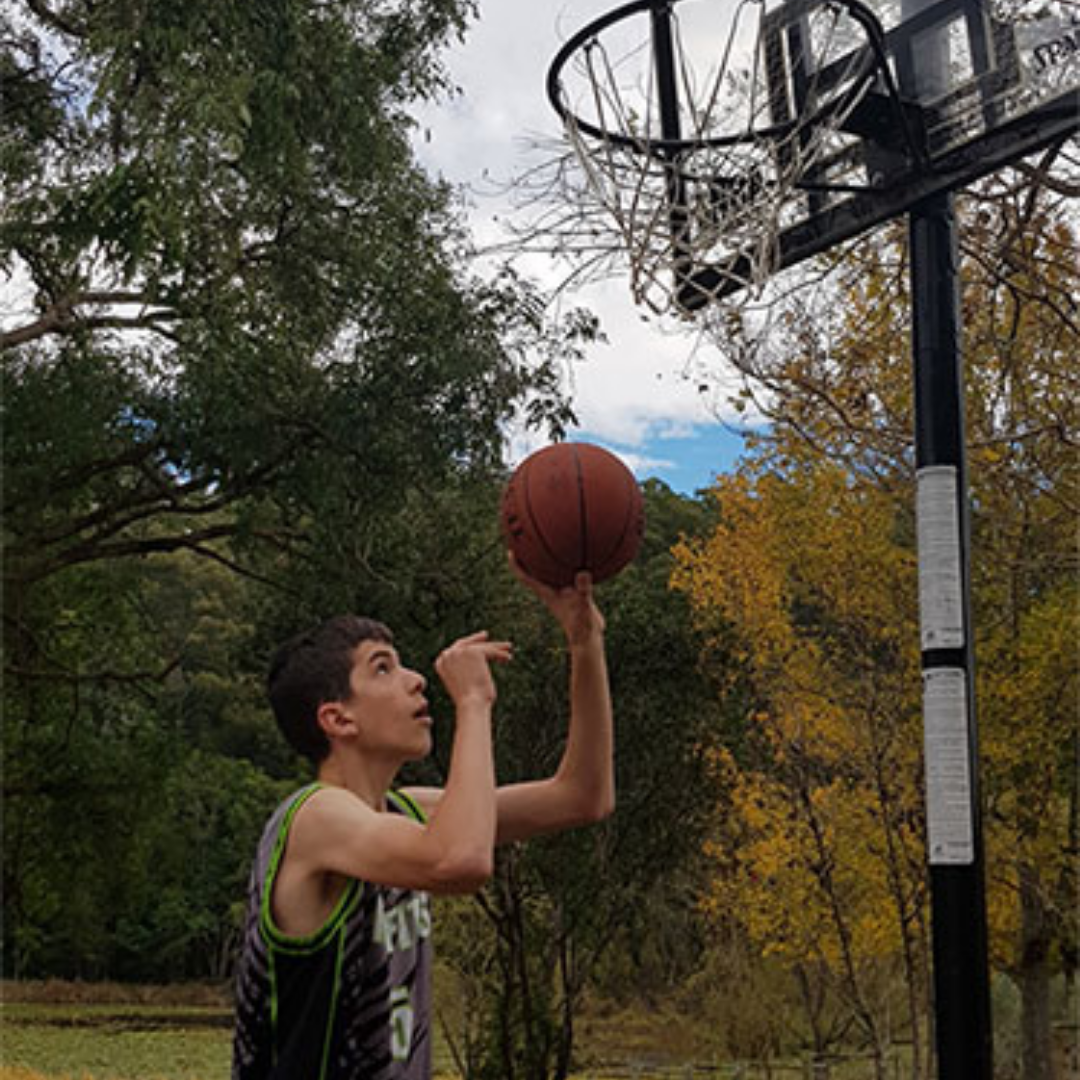
I relished being able to run the length of the court dribbling the ball and could see the tears in Mum’s eyes as she cheered from the sidelines. I'm not the best player on the team, but I try hard and improving every time I play. The coach is understanding of my condition and limitations, but the guys make no concessions for me, which is perfect. So, this was my rehabilitation instead of physiotherapy and occupational therapy.
Heading into High School, I made some good friends and the bullying has started to settle down and doesn’t affect me so much. I have found that I can now make fun of myself and join in the laughter. I find that I have a dark sense of humour sometimes and can turn an insult into a joke at my expense, which turns the table on the bully. I have a great circle of friends now (not the most popular kids), but genuine mates who are there to support me and have my back.

I know now that I am here for a reason. Maybe it is to do genetic research into Neurofibromatosis? I want to map the genome and match it to the different clinical manifestations of NF. It might be possible to then engineer proteins to prevent NF tumours. Maybe it is to become a great Dad and husband. Maybe it is to travel and have adventures around the world. Maybe it is all of these and more."
In 2020, my basketball team moved up to Division 1 where the skill requirement is much higher. The excessive force needed to bolt up the court, increased tension and higher aggression was more than I could tolerate. I was unable to be on court for longer than five minutes without losing my breath and I became exhausted quickly. I was working with only 70% of the average lung capacity for someone my size and age due to my pes excavatum, a chest deformity that worsened dramatically through puberty.
A 6CM INDENTATION IN MY CHEST WAS IMPACTING MY ORGANS
A "pectus excavatum" gave me a nearly 6cm indentation in my chest, hunched my back forward and pulled my shoulders in giving me constant bad posture. In public pools or the beach where people other than family could see I never went shirtless, I always had a rashee on to partly cover the pectus excavatum deformity and my much skinnier than average body. I sit on the lowest 25 percentile for weight for someone my height, another one of NF1’s potential impacts.
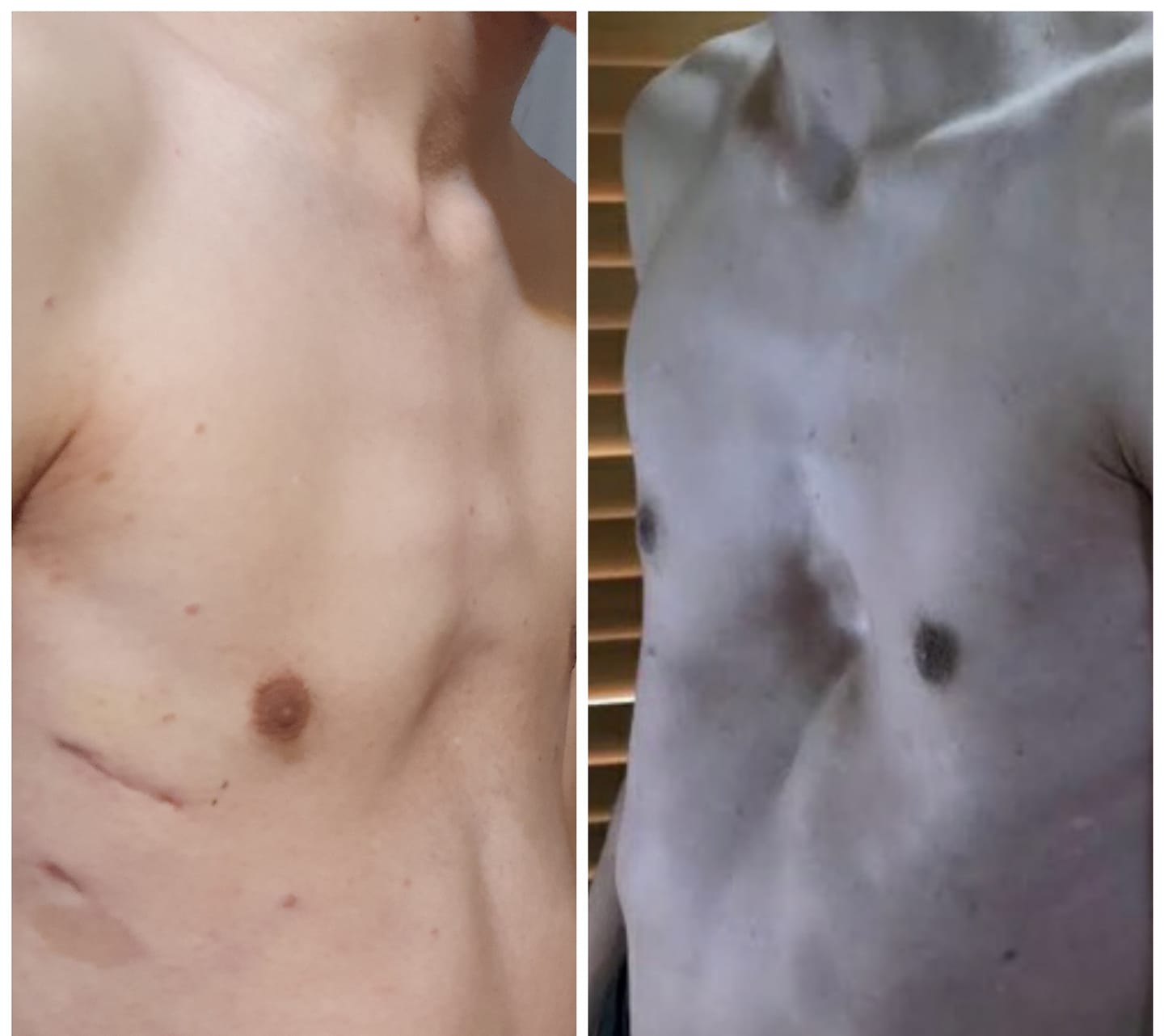 I pushed my parents into looking into Pectus excavatum surgery to fix the many bone deformities that came with it. We saw a Paediatric Respiratory Specialist, who measured my lung capacity and performed a CT scan, which came up clear for further significant neuromas. It also showed the extent of the deformity and its impact on my internal organs.
I pushed my parents into looking into Pectus excavatum surgery to fix the many bone deformities that came with it. We saw a Paediatric Respiratory Specialist, who measured my lung capacity and performed a CT scan, which came up clear for further significant neuromas. It also showed the extent of the deformity and its impact on my internal organs.
I signed all consent forms to agree to the surgery myself, as I was just shy of 16. I was keen to do this as I had been pushing for the surgery for close to a year and had researched the Nuss bar corrective surgery to understand the operational and healing processes.
On the 8th of December 2020, I had the Nuss procedure which involved inserting a metal bar to push my ribcage and sternum forward and outward. The procedure changed my pectus to a roughly 1cm indent, fixed my hunched shoulder posture and interestingly, some of my thoracic scoliosis.
The Nuss surgery was extremely painful, and I was on a morphine drip for two days after a kink in the epidural anaesthetic placed in my upper thoracic spine made it necessary for it to be removed earlier than planned. The excess morphine I was taking to control the pain made me nauseous and meant I couldn't stomach food. Moving made me vomit as well, which made it harder to complete my physiotherapy.
I was essentially bed ridden for a week in hospital unable to tolerate food. Even after I returned home, I was unable to do very much physical movement. I started to get muscle atrophy due to lack of food and exercise. I already had low body muscle and fat due to complications with Neurofibromatosis, so this only made things worse.
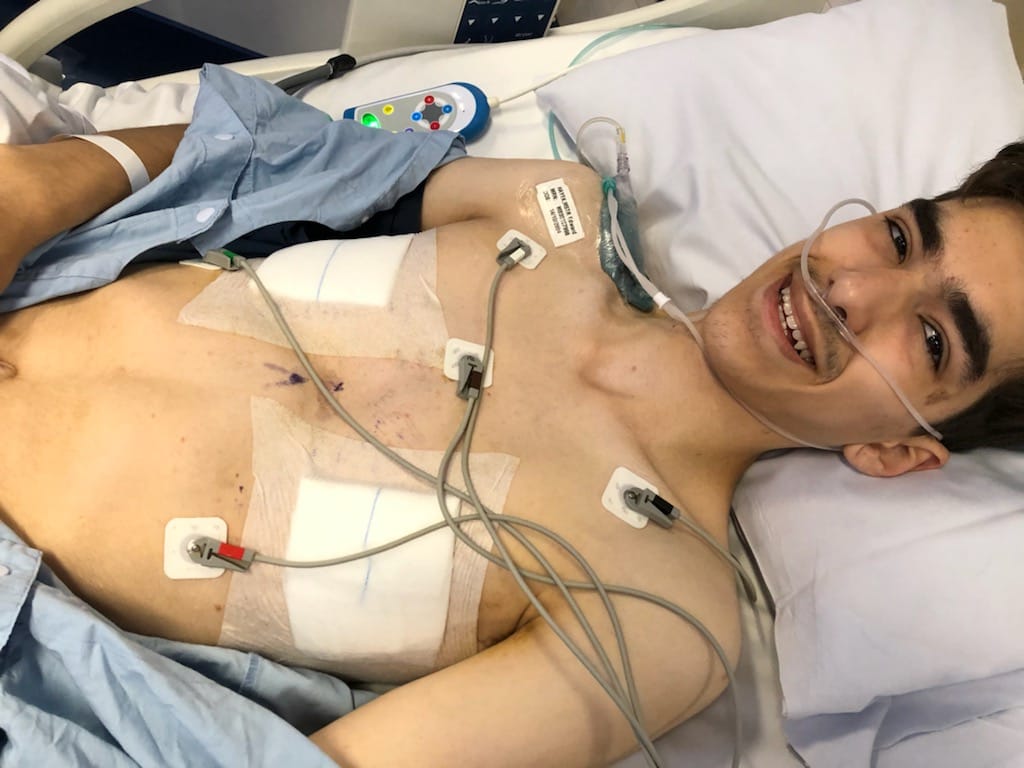 Over the following month, I finally started doing light movements and hopefully in the following weeks will move up to some more physical activity at home, including light hand weights to build up muscle.I know this will be harder for me than others due to my NF, but I'm determined to gain some body fat by eating a lot more and more muscle from working out.
Over the following month, I finally started doing light movements and hopefully in the following weeks will move up to some more physical activity at home, including light hand weights to build up muscle.I know this will be harder for me than others due to my NF, but I'm determined to gain some body fat by eating a lot more and more muscle from working out.
At the moment I sit at 58kg and I am 188cm tall (6ft 2inches).
By the end of 2021, I want to gain up to 10 kg of fat and muscle which will bring me closer to a normal weight for my height.
It's uncomfortable when well-meaning teachers ask if I am anorexic and whether I am eating.
I know there are good things in my future to come. One step at a time.